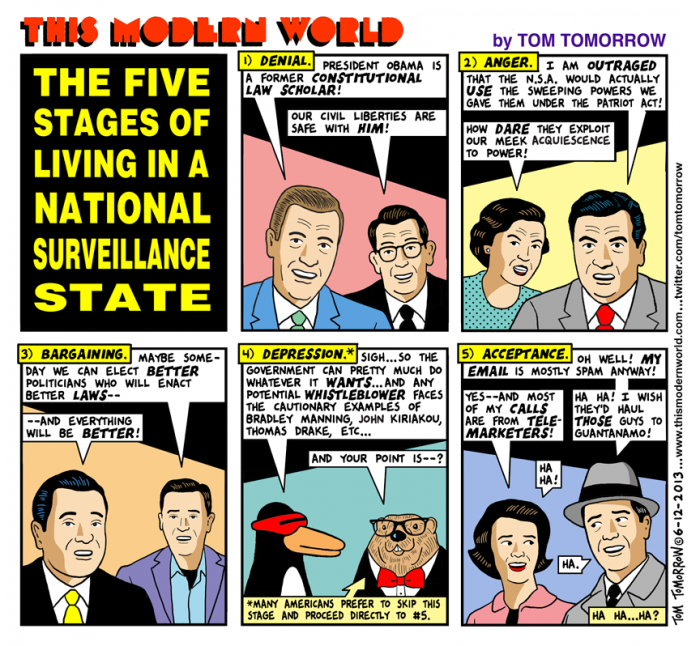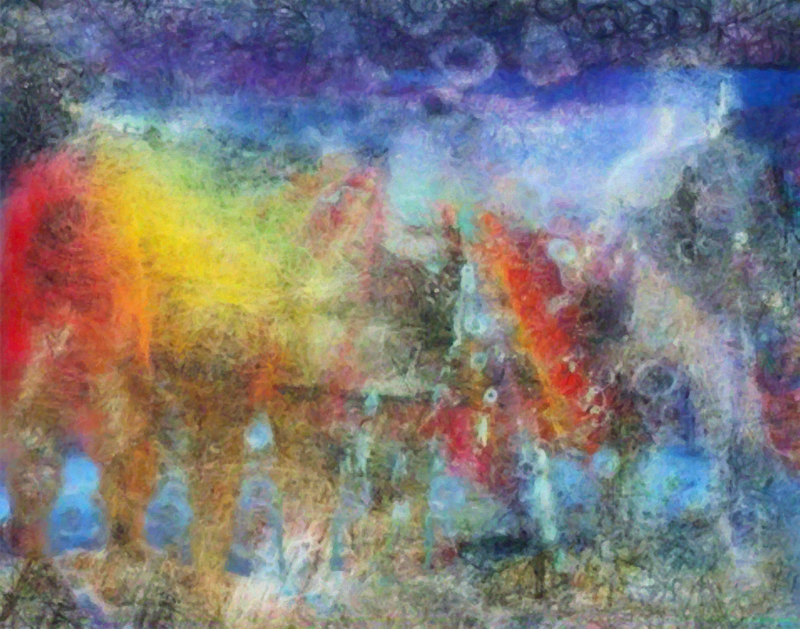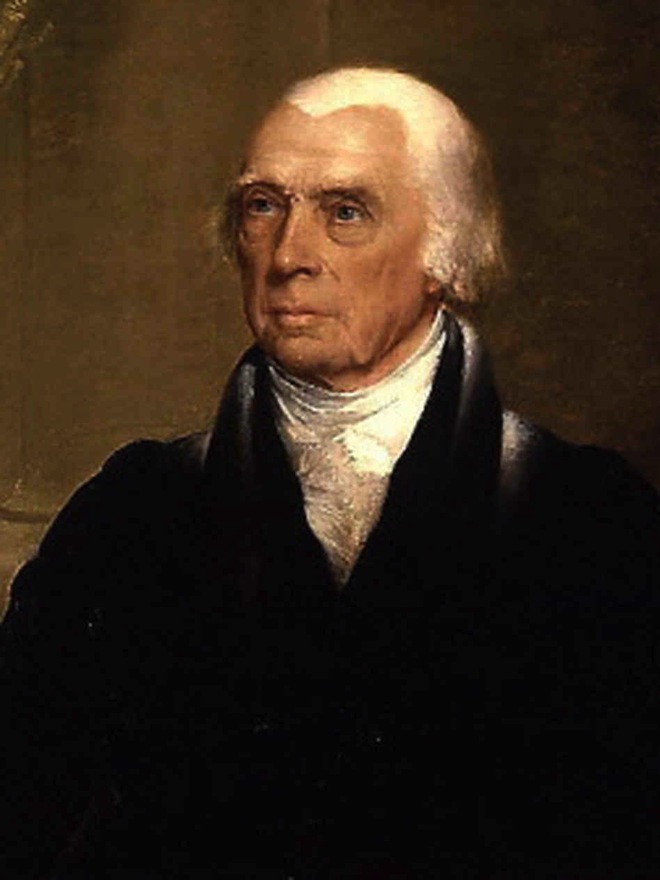
Memorial and Remonstrance Against Religious Assessments
James Madison
[June 20, 1785]
To the Honorable the General Assembly of the Commonwealth of Virginia –
A Memorial and Remonstrance Against Religious Assessments
We the subscribers , citizens of the said Commonwealth, having taken into serious consideration, a Bill printed by order of the last Session of General Assembly, entitled “A Bill establishing a provision for Teachers of the Christian Religion,” and conceiving that the same if finally armed with the sanctions of a law, will be a dangerous abuse of power, are bound as faithful members of a free State to remonstrate against it, and to declare the reasons by which we are determined. We remonstrate against the said Bill,
Because we hold it for a fundamental and undeniable truth, “that religion or the duty which we owe to our Creator and the manner of discharging it, can be directed only by reason and conviction, not by force or violence.” The Religion then of every man must be left to the conviction and conscience of every man; and it is the right of every man to exercise it as these may dictate. This right is in its nature an unalienable right. It is unalienable, because the opinions of men, depending only on the evidence contemplated by their own minds cannot follow the dictates of other men: It is unalienable also, because what is here a right towards men, is a duty towards the Creator. It is the duty of every man to render to the Creator such homage and such only as he believes to be acceptable to him. This duty is precedent, both in order of time and in degree of obligation, to the claims of Civil Society. Before any man can be considerd as a member of Civil Society, he must be considered as a subject of the Governour of the Universe: And if a member of Civil Society, do it with a saving of his allegiance to the Universal Sovereign. We maintain therefore that in matters of Religion, no man’s right is abridged by the institution of Civil Society and that Religion is wholly exempt from its cognizance. True it is, that no other rule exists, by which any question which may divide a Society, can be ultimately determined, but the will of the majority; but it is also true that the majority may trespass on the rights of the minority.
Because Religion be exempt from the authority of the Society at large, still less can it be subject to that of the Legislative Body. The latter are but the creatures and vicegerents of the former. Their jurisdiction is both derivative and limited: it is limited with regard to the co-ordinate departments, more necessarily is it limited with regard to the constituents. The preservation of a free Government requires not merely, that the metes and bounds which separate each department of power be invariably maintained; but more especially that neither of them be suffered to overleap the great Barrier which defends the rights of the people. The Rulers who are guilty of such an encroachment, exceed the commission from which they derive their authority, and are Tyrants. The People who submit to it are governed by laws made neither by themselves nor by an authority derived from them, and are slaves.
Because it is proper to take alarm at the first experiment on our liberties. We hold this prudent jealousy to be the first duty of Citizens, and one of the noblest characteristics of the late Revolution. The free men of America did not wait till usurped power had strengthened itself by exercise, and entagled the question in precedents. They saw all the consequences in the principle, and they avoided the consequences by denying the principle. We revere this lesson too much soon to forget it. Who does not see that the same authority which can establish Christianity, in exclusion of all other Religions, may establish with the same ease any particular sect of Christians, in exclusion of all other Sects? that the same authority which can force a citizen to contribute three pence only of his property for the support of any one establishment, may force him to conform to any other establishment in all cases whatsoever?
Because the Bill violates the equality which ought to be the basis of every law, and which is more indispensible, in proportion as the validity or expediency of any law is more liable to be impeached. If “all men are by nature equally free and independent,” all men are to be considered as entering into Society on equal conditions; as relinquishing no more, and therefore retaining no less, one than another, of their natural rights. Above all are they to be considered as retaining an “equal title to the free exercise of Religion according to the dictates of Conscience.” Whilst we assert for ourselves a freedom to embrace, to profess and to observe the Religion which we believe to be of divine origin, we cannot deny an equal freedom to those whose minds have not yet yielded to the evidence which has convinced us. If this freedom be abused, it is an offence against God, not against man: To God, therefore, not to man, must an account of it be rendered. As the Bill violates equality by subjecting some to peculiar burdens, so it violates the same principle, by granting to others peculiar exemptions. Are the quakers and Menonists the only sects who think a compulsive support of their Religions unnecessary and unwarrantable? can their piety alone be entrusted with the care of public worship? Ought their Religions to be endowed above all others with extraordinary privileges by which proselytes may be enticed from all others? We think too favorably of the justice and good sense of these demoninations to believe that they either covet pre-eminences over their fellow citizens or that they will be seduced by them from the common opposition to the measure.
Because the Bill implies either that the Civil Magistrate is a competent Judge of Religious Truth; or that he may employ Religion as an engine of Civil policy. The first is an arrogant pretension falsified by the contradictory opinions of Rulers in all ages, and throughout the world: the second an unhallowed perversion of the means of salvation.
Because the establishment proposed by the Bill is not requisite for the support of the Christian Religion. To say that it is, is a contradiction to the Christian Religion itself, for every page of it disavows a dependence on the powers of this world: it is a contradiction to fact; for it is known that this Religion both existed and flourished, not only without the support of human laws, but in spite of every opposition from them, and not only during the period of miraculous aid, but long after it had been left to its own evidence and the ordinary care of Providence. Nay, it is a contradiction in terms; for a Religion not invented by human policy, must have pre-existed and been supported, before it was established by human policy. It is moreover to weaken in those who profess this Religion a pious confidence in its innate excellence and the patronage of its Author; and to foster in those who still reject it, a suspicion that its friends are too conscious of its fallacies to trust it to its own merits.
Because experience witnesseth that eccelsiastical establishments, instead of maintaining the purity and efficacy of Religion, have had a contrary operation. During almost fifteen centuries has the legal establishment of Christianity been on trial. What have been its fruits? More or less in all places, pride and indolence in the Clergy, ignorance and servility in the laity, in both, superstition, bigotry and persecution. Enquire of the Teachers of Christianity for the ages in which it appeared in its greatest lustre; those of every sect, point to the ages prior to its incorporation with Civil policy. Propose a restoration of this primitive State in which its Teachers depended on the voluntary rewards of their flocks, many of them predict its downfall. On which Side ought their testimony to have greatest weight, when for or when against their interest?
Because the establishment in question is not necessary for the support of Civil Government. If it be urged as necessary for the support of Civil Government only as it is a means of supporting Religion, and it be not necessary for the latter purpose, it cannot be necessary for the former. If Religion be not within the cognizance of Civil Government how can its legal establishment be necessary to Civil Government? What influence in fact have ecclesiastical establishments had on Civil Society? In some instances they have been seen to erect a spiritual tyranny on the ruins of the Civil authority; in many instances they have been seen upholding the thrones of political tyranny: in no instance have they been seen the guardians of the liberties of the people. Rulers who wished to subvert the public liberty, may have found an established Clergy convenient auxiliaries. A just Government instituted to secure & perpetuate it needs them not. Such a Government will be best supported by protecting every Citizen in the enjoyment of his Religion with the same equal hand which protects his person and his property; by neither invading the equal rights of any Sect, nor suffering any Sect to invade those of another.
Because the proposed establishment is a departure from the generous policy, which, offering an Asylum to the persecuted and oppressed of every Nation and Religion, promised a lustre to our country, and an accession to the number of its citizens. What a melancholy mark is the Bill of sudden degeneracy? Instead of holding forth an Asylum to the persecuted, it is itself a signal of persecution. It degrades from the equal rank of Citizens all those whose opinions in Religion do not bend to those of the Legislative authority. Distant as it may be in its present form from the Inquisition, it differs from it only in degree. The one is the first step, the other the last in the career of intolerance. The maganimous sufferer under this cruel scourge in foreign Regions, must view the Bill as a Beacon on our Coast, warning him to seek some other haven, where liberty and philanthrophy in their due extent, may offer a more certain respose from his Troubles.
Because it will have a like tendency to banish our Citizens. The allurements presented by other situations are every day thinning their number. To superadd a fresh motive to emigration by revoking the liberty which they now enjoy, would be the same species of folly which has dishonoured and depopulated flourishing kingdoms
Because it will destroy that moderation and harmony which the forbearance of our laws to intermeddle with Religion has produced among its several sects. Torrents of blood have been split in the old world, by vain attempts of the secular arm, to extinguish Religious disscord, by proscribing all difference in Religious opinion. Time has at length revealed the true remedy. Every relaxation of narrow and rigorous policy, wherever it has been tried, has been found to assauge the disease. The American Theatre has exhibited proofs that equal and compleat liberty, if it does not wholly eradicate it, sufficiently destroys its malignant influence on the health and prosperity of the State. If with the salutary effects of this system under our own eyes, we begin to contract the bounds of Religious freedom, we know no name that will too severely reproach our folly. At least let warning be taken at the first fruits of the threatened innovation. The very appearance of the Bill has transformed “that Christian forbearance, love and chairty,” which of late mutually prevailed, into animosities and jeolousies, which may not soon be appeased. What mischiefs may not be dreaded, should this enemy to the public quiet be armed with the force of a law?
Because the policy of the Bill is adverse to the diffusion of the light of Christianity. The first wish of those who enjoy this precious gift ought to be that it may be imparted to the whole race of mankind. Compare the number of those who have as yet received it with the number still remaining under the dominion of false Religions; and how small is the former! Does the policy of the Bill tend to lessen the disproportion? No; it at once discourages those who are strangers to the light of revelation from coming into the Region of it; and countenances by example the nations who continue in darkness, in shutting out those who might convey it to them. Instead of Levelling as far as possible, every obstacle to the victorious progress of Truth, the Bill with an ignoble and unchristian timidity would circumscribe it with a wall of defence against the encroachments of error.
Because attempts to enforce by legal sanctions, acts obnoxious to go great a proportion of Citizens, tend to enervate the laws in general, and to slacken the bands of Society. If it be difficult to execute any law which is not generally deemed necessary or salutary, what must be the case, where it is deemed invalid and dangerous? And what may be the effect of so striking an example of impotency in the Government, on its general authority?
Because a measure of such singular magnitude and delicacy ought not to be imposed, without the clearest evidence that it is called for by a majority of citizens, and no satisfactory method is yet proposed by which the voice of the majority in this case may be determined, or its influence secured. The people of the respective counties are indeed requested to signify their opinion respecting the adoption of the Bill to the next Session of Assembly.” But the representatives or of the Counties will be that of the people. Our hope is that neither of the former will, after due consideration, espouse the dangerous principle of the Bill. Should the event disappoint us, it will still leave us in full confidence, that a fair appeal to the latter will reverse the sentence against our liberties.
Because finally, “the equal right of every citizen to the free exercise of his Religion according to the dictates of conscience” is held by the same tenure with all our other rights. If we recur to its origin, it is equally the gift of nature; if we weigh its importance, it cannot be less dear to us; if we consult the “Declaration of those rights which pertain to the good people of Vriginia, as the basis and foundation of Government,” it is enumerated with equal solemnity, or rather studied emphasis. Either the, we must say, that the Will of the Legislature is the only measure of their authority; and that in the plenitude of this authority, they may sweep away all our fundamental rights; or, that they are bound to leave this particular right untouched and sacred: Either we must say, that they may controul the freedom of the press, may abolish the Trial by Jury, may swallow up the Executive and Judiciary Powers of the State; nay that they may despoil us of our very right of suffrage, and erect themselves into an independent and hereditary Assembly or, we must say, that they have no authority to enact into the law the Bill under consideration.
We the Subscribers say, that the General Assembly of this Commonwealth have no such authority: And that no effort may be omitted on our part against so dangerous an usurpation, we oppose to it, this remonstrance; earnestly praying, as we are in duty bound, that the Supreme Lawgiver of the Universe, by illuminating those to whom it is addressed, may on the one hand, turn their Councils from every act which would affront his holy prerogative, or violate the trust committed to them: and on the other, guide them into every measure which may be worthy of his [blessing, may re]dound to their own praise, and may establish more firmly the liberties, the prosperity and the happiness of the Commonwealth.
Comment:
“Madison’s Memorial and Remonstrance was written in opposition to a bill, introduced into the General Assembly of Virginia, to levy a general assessment for the support of teachers of religions. The assessment bill was tabled, and in its place the legislature enacted Jefferson’s Bill for Religious Liberty.” ( Source: Hensel, Jaye B., Ed., Church, State, and Politics Washington D.C. Final Report of the 1981 Chief Justice Earl Warren Conference on Adovcacy in the United States)
Thomas Jefferson had drafted The Virginia Act for Establishing Religious Freedom in 1779 three years after he wrote the Declaration of Independence. The act was not passed by the General Assembly of the Commonwealth of Virginia until 1786. Jefferson was by then in Paris as the U.S. Ambassador to France. The Act was resisted by a group headed by Patrick Henry who sought to pass a bill that would have assessed all the citizens of Virginia to support a plural establishment. James Madison’s Memorial and Remonstrance Against Religious Assessments was, and remains, a powerful argument against state supported religion. It was written in 1785, just a few months before the General Assembly passed Jefferson’s religious freedom bill.
h/t Library of Religious Freedom, University of Virginia





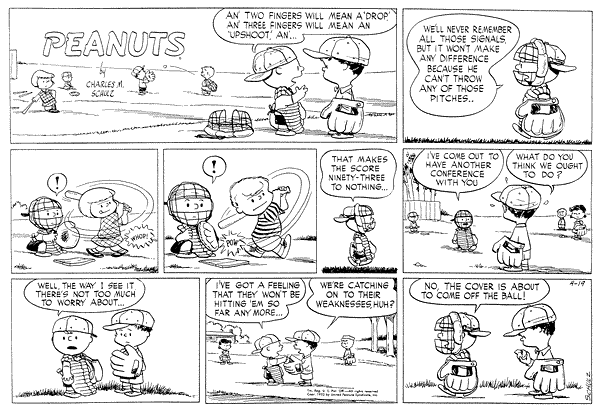
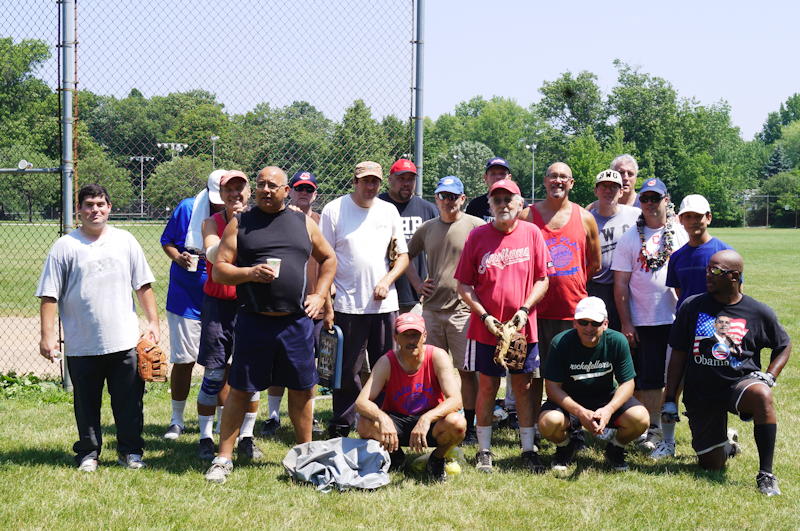
 Andre pre-game vocal warm up.
Andre pre-game vocal warm up.


